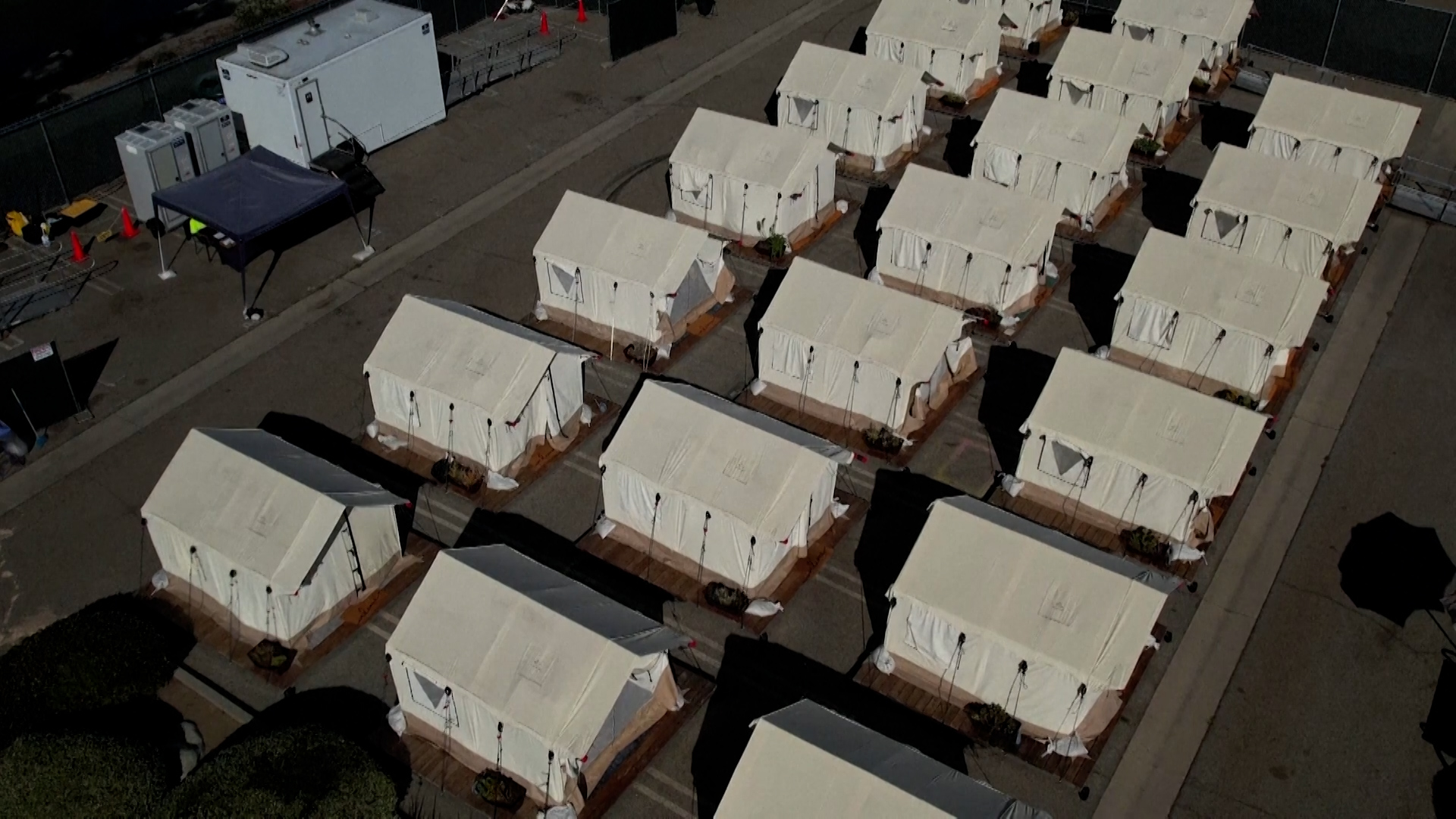
[LAUREN TAYLOR]
THESE TENT ENCAMPMENTS WERE MEANT TO BE A QUICK SOLUTION — TO A GROWING PROBLEM.
AN IDEA — FIRST INTRODUCED IN SAN FRANCISCO AS A ‘SAFE SLEEP VILLAGE’ FOR THE HOMELESS IN 2021 —
THEY POPPED UP IN CITIES ACROSS THE U.S., PROVIDING TENTS, TOILETS AND SHOWERS.
HOWEVER – THESE SITES ARE COSTING CITIES TENS OF THOUSANDS OF DOLLARS PER TENT. A PRICE SOME SAY IS MORE EXPENSIVE THAN BRICK AND MORTAR SHELTERS.
IN TOTAL, THE EXPENSES FOR SETTING UP FENCING, BATHROOMS, AND STAFFING THE FACILITIES — FOR ONE SITE IN LOS ANGELES COSTS ABOUT $4 MILLION DOLLARS – AND TAKES AN ESTIMATED $3 MILLION A YEAR TO OPERATE.
BUT ADVOCATES SAY THEY LOOK BEYOND THE COST — TO THE QUICK HELP THE SHELTERS CAN PROVIDE.
KIRKPATRICK TYLER | CHIEF OF GOVERNMENT AND COMMUNITY AFFAIRS FOR URBAN ALCHEMY
What safe sleeps allow are for folks to remain connected to an environment that’s familiar, but also have an environment that is service rich, safe and supported.
In the conversation about housing production, these are the types of interventions that are fast. These are the types of interventions that don’t require a lot of permitting and groundbreaking and all of that stuff.
[LAUREN TAYLOR]
ALL THIS WHILE THE SUPREME COURT CONSIDERS A CASE THAT COULD DETERMINE HOW CITIES CAN RESPOND TO UNCONTROLLED TENT ENCAMPMENTS — KNOWN TO BE DANGEROUS AND UNHEALTHY — BOTH FOR THOSE LIVING IN THEM AND THOSE LIVING IN THE COMMUNITIES AROUND THEM.
THAT CASE IS CALLED JOHNSON V. GRANTS PASS, OREGON.
THE QUESTION IN FRONT OF THE JUSTICES — IS ENFORCING LAWS ON CAMPING IN PUBLIC AREAS CONSIDERED ‘CRUEL AND UNUSUAL PUNISHMENT’ UNDER THE EIGHTH AMENDMENT?
THE NINTH CIRCUIT COURT OF APPEALS RULED IT IS — AND THAT OFFICIALS LACK THE AUTHORITY TO JAIL OR FINE HOMELESS INDIVIDUALS FOR SLEEPING OUTDOORS.
OFFICIALS FROM WESTERN CITIES AND STATES COVERED BY THE NINTH CIRCUIT CLAIM THE RULING HAS THEM HAMSTRUNG.
CALIFORNIA CITY LEADERS HAVE REPEATEDLY POINTED OUT HOW IT HAS MADE IT HARDER TO PROTECT THE HEALTH AND SAFETY OF THEIR CONSTITUENTS.
GOVERNOR GAVIN NEWSOM WELCOMES A SUPREME COURT RULING ON JOHNSON V GRANTS PASS SAYING:
The Supreme Court can now correct course and end the costly delays from lawsuits that have plagued our efforts to clear encampments and deliver services to those in need.
CALIFORNIA HAS 28% OF THE NATION’S TOTAL HOMELESS POPULATION WITH MORE THAN 180,000 INDIVIDUALS.
IN RECENT MONTHS HOWEVER CALIFORNIA HAS TAKEN OTHER MEASURES TO CLEAR ENCAMPMENTS WITHOUT IMPOSING FINES – A $750 MILLION GRANT TO CITIES— DUBBED THE ENCAMPMENT RESOLUTION FUND — HAS BEEN USED TO CLEAR UNCONTROLLED ENCAMPMENTS ACROSS THE STATE WHILE SIMULTANEOUSLY FINDING PEOPLE LONG-TERM HOUSING.
GOV. GAVIN NEWSOM
And it’s not kicking out people. It’s not just removing the encampments. It’s resolving the underlying conditions. That’s one of many strategies of accountability, though, at the end of the day is the call of the day. State visions realized at the local level.
[LAUREN TAYLOR]
CURRENTLY – THERE IS NO DATE SET FOR THE JUSTICES TO HEAR THE CASE.







